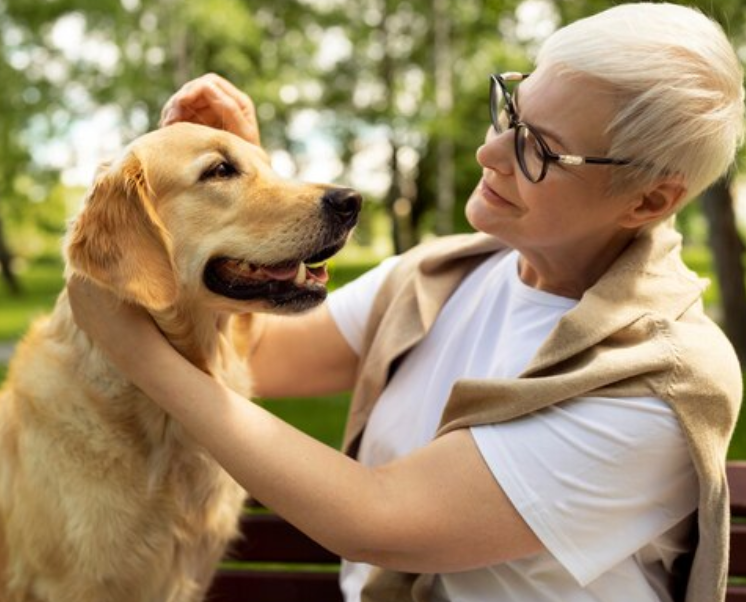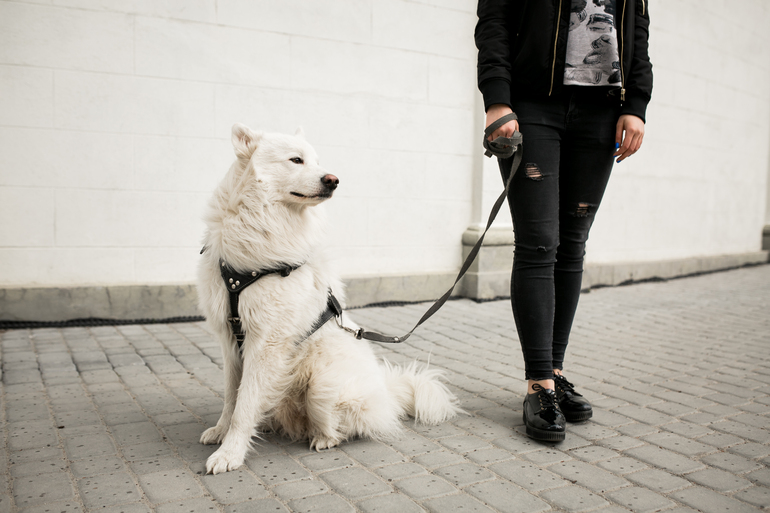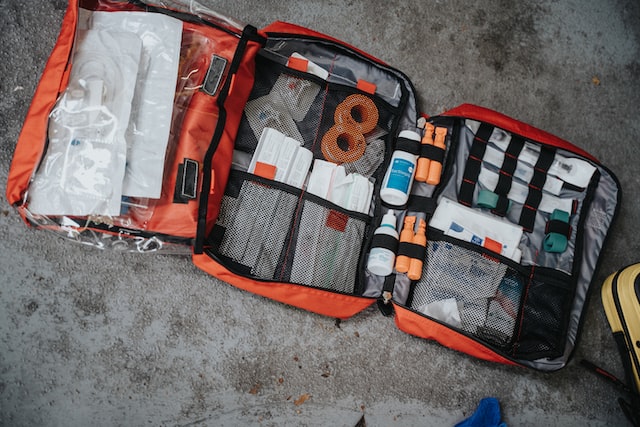- Service Dogs Access Rights According to the Americans with Disabilities Act (ADA)
- ADA Penalties for Refusing a Service Dog Access
- Penalties for Violation of the Fair Housing Act
- Penalties in the UK for Refusing Access to Assistance Dogs
- Penalties in Canada for Refusing Access to Service Dogs
- How to Identify Real Service Dogs?

Service dogs can be considered many things- our most loyal companions, trained assistants, medical necessities, and also our family members. They are always by our side, supporting us in all daily challenges we may face, by performing specific work and providing their unconditional support and love.
Service dogs are not pets, as they undergo specific training to learn to perform specific tasks for the benefit of their owner with a disability and to behave properly around other animals and people.
Considering the status of service animals of medical equipment and the work and effort their training typically requires, you can imagine what frustration a service dog handler may experience to have their service animal refused public access. Denying a service dog is usually a very stressful experience for their handlers, which can even cause temporary worsening of their symptoms, e.g. increased anxiety. The act of refusing a trained service dog access to a public place is not only a stressful event for the handler but also an act of discrimination that is subject to penalties.

Service Dogs Access Rights According to the Americans with Disabilities Act (ADA)
The ADA, which defines service animals as individually trained dogs, who perform specific tasks for the benefit of a person with a disability, states that:
“State and local governments, businesses, and nonprofit organizations that serve the public generally must allow service animals to accompany people with disabilities in all areas of the facility where the public is allowed to go. For example, in a hospital, it usually would be inappropriate to exclude a service animal from areas such as patient rooms, clinics, cafeterias, or examination rooms. However, it may be appropriate to exclude a service animal from operating rooms or burn units where the animal’s presence may compromise a sterile environment.”
The ADA explicitly clarifies that allergy to dog fur is not considered a sound reason for the dog to be excluded from the premises. If a person, who is allergic to dog dander and a service dog handler are in the same room/facility, they both must be accommodated and assigned to different areas of the room/facility if possible.
Even if staff have a legitimate reason to exclude a service dog, i.e. because the dog is not under control or they are not housebroken, their handler still must be offered the goods/services the business provides. Service dog handlers can not be isolated from other guests/clients and treated less favorably.
Service dogs can not be charged fees, even if there are fees for other animals (such as pets/livestock). However, if the dog causes any damage, their handler can be charged the fees that other guests/clients would typically be charged.
More detailed information about service animals and their access rights, situations when they can be excluded and fees can be found on the page ADA Requirements: Service Animals.
ADA Penalties for Refusing a Service Dog Access
Let’s start with a quick explanation of the purpose of Title III of the ADA. It “prohibits discrimination on the basis of disability by public accommodations and requires places of public accommodation and commercial facilities to be designed, constructed, and altered in compliance with the accessibility standards established by this part.”
Having said that, the act of refusing a trained service dog access to places open for use to the public is considered discrimination, therefore it is subject to penalty.
In 2014, the Department of Justice issued a Final Rule to adjust the civil monetary penalties to the inflation. These are enforced by the Civil Rights Division and also include civil penalties, which are available under Title III of the ADA.
According to the Final Rule, for the ADA, “this adjustment increases the maximum civil penalty for a first violation under Title III from $55,000 to $75,000; for a subsequent violation, the new maximum is $150,000. The new maximums apply only to violations occurring on or after April 28, 2014.”
This rule provides for 2023 inflation adjustments of civil monetary penalty amounts required by the Federal Civil Penalties Inflation Adjustment Act of 1990, as amended by the Federal Civil Penalties Inflation Adjustment Act Improvements Act of 2015 (the 2015 Act). This rule also revises HUD's policy and applies annually adjusted penalty amounts to the date the penalty is assessed after the effective date of the rule (if the violation occurred after the enactment of the 2015 Act).

Penalties for Violation of the Fair Housing Act
Service dogs in the US are protected not only by the ADA but also by the Fair Housing Act. You may also be interested in the Final Rule by the Housing and Urban Development Department in regard to the Adjustment of Civil Monetary Penalty Amounts for 2023. It became effective in March 2023.
“This final rule makes the required 2023 inflation adjustment of HUD's civil money penalty amounts. The 2023 increases apply to penalties assessed on or after this rule's effective date. HUD provides a table showing how, for each component, the penalties are being adjusted for 2023 pursuant to the 2015 Act. In the first column (“Description”), HUD provides a description of the penalty. In the second column (“Statutory Citation”), HUD provides the United States Code statutory citation providing for the penalty. In the third column (“Regulatory Citation”), HUD provides the Code of Federal Regulations citation under Title 24 for the penalty. In the fourth column (“Previous Amount”), HUD provides the amount of the penalty pursuant to the rule implementing the 2022 adjustment (87 FR 24418, April 26, 2022). In the fifth column (“2023 Adjusted Amount”), HUD lists the penalty after applying the 2023 inflation adjustment.”
We will list below the Fair Housing Act Civil Penalties, both the previous ones and the adjusted ones:
|
Previous Amount |
Adjusted Amount |
|
No Priors: $23,011 |
No Priors: $24,793 |

Penalties in the UK for Refusing Access to Assistance Dogs
According to Section 170 of the Equality Act 2010, “operators and drivers of private hire vehicles in England and Wales have duty to transport a disabled person’s assistance dog and allow it to stay with the passenger without making any additional charge. Under section 20 of the Civic Government (Scotland) Act 1982, regulations may make a provision corresponding to section 170 for Scotland”.
The act of refusing an assistance dog in the vehicle is considered an offense and is punished by a fine of up to £1,000. A person guilty of an offense (under subsection 9) can be charged a fine not exceeding level 3 on the standard scale. Additionally, drivers of private hire vehicles can not charge additional fees for carrying an assistance dog.
In September 2016, the London Assembly supported the Guide Dogs for the Blind campaign, calling for an increase of the penalty for refusing carriage to a level 4 fine.
According to the information listed on the website of the Sentencing Council, the maximum fine that belongs to Level 3 can not exceed £1,000; while the maximum fine for Level 4 should not exceed £2,500.

Penalties in Canada for Refusing Access to Service Dogs
The maximum amount of fines that businesses in Canada may be charged for refusing a service dog may vary based on provincial laws. We will list below information about the fines in several Canadian provinces:
Nova Scotia
In Nova Scotia, the Service Dog Act protects the rights and responsibilities of service dog owners. It aims to prevent service dog owners from being denied access to public places and refused tenancy rights.
Denying access or tenancy to a certified team is considered a serious offense. However, the Act also clarifies that it is considered an offense to falsely present a dog as a part of a service dog team, a retired service dog or a service dog in training. The maximum fine for Service Dog Act violations is $3,000.
British Columbia
According to the Guide Dog and Service Dog Act in British Columbia, it is an offense to deny a certified service dog team access or accommodation. The maximum fine that may be charged is also up to $3,000
Service dog handlers who feel discriminated against and wrongly denied access or accommodation have the right to submit a Complaint Form to Security Programs or contact the BC Human Rights Tribunal.
Alberta
The Service Dogs Act in Alberta mandates fines for violations from both service dog handlers and businesses. Fines are as follows:
-Falsely claiming to be a disabled person to get protection under the act: $300;
-Refusing to return a service dog identification card when asked to do so: $300;
-Discriminating against a person lawfully using a qualified service dog or refusing access to qualified service dog teams: $300.
Ontario
According to Bill 80, Ontario Service Dogs Act, 2016, the amount of the fine for violating the rights of people who use service dogs, can not exceed $5000.
You can find the full text in Bill 80 of the Act in regard to the rights of service dog teams on the following page: An Act respecting the rights of persons with disabilities who use service dogs.

How to Identify Real Service Dogs?
The easiest way to do it is by observing their behavior. Trained service dogs are well-mannered, under control, and able to ignore distractions in their surroundings. They do not pull on a leash, sniff around for food, seek attention, or try to jump on passersby/guests/clients, or animals.
Often, they wear identification gear, but this is not mandatory in many countries. Wearing service dog training/identification gear is recommended, but it does not automatically guarantee a service dog access rights, nor the lack of such (if not legally required) can be used as an excuse for a service dog to be denied access.
Service dog handlers should be able to explain what tasks their dogs have been trained to perform for their benefit if asked. However, the public should also approach service dog teams with respect and not require private information about the person’s disability.
Based on local laws, staff/landlords may require certain documentation, such as a medical letter, as proof of the legitimacy of the dog as a service animal and the person’s need for their assistance. This type of documentation is usually required when the individual’s disability is not apparent.
Depending on the regulations, dog owners may need to have their service dogs trained and certified by a member of Assistance Dogs International (ADI) or the International Guide Dog Federation (IGDF) or be allowed to train them themselves.
Training your own service dog is allowed in many countries, among which are the US, the UK, the Netherlands, and some parts of Canada (some provinces allow self-trained teams to go through a further evaluation to be recognized).
We would advise you to review your local laws and make an informed decision.












